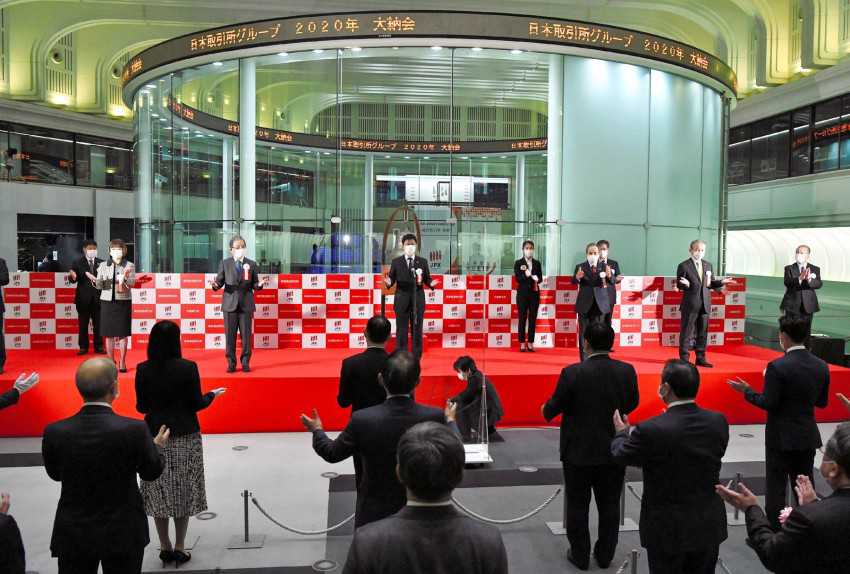Tokyo stocks saw climbing in 2021 on monetary recovery from pandemic
01 January, 2021

Tokyo stocks are likely to climb in 2021 with progress found in global COVID-19 vaccinations helping to improve the business environment and Japan's accommodative monetary plans remaining in place.
Analysts forecast the benchmark 225-issue Nikkei Inventory Average, which finished 2020 trading in the highest year-end close since 1989, will move between 21,000 and 30,500 in 2021.
"In the first one half of 2021, the currency markets will still be weighed straight down by the continuing pandemic. But as more persons get vaccinated, you will have a greater pickup in the second half," said Makoto Sengoku, senior equity marketplace analyst at the Tokai Tokyo Exploration Institute.
Sengoku said the 30,000 mark will come within reach by the end of 2021, as more companies are anticipated to buy back again their shares to improve shareholder returns.
Foreign investors, who have been net buyers of Japanese stocks in recent months, are likely to remain buyers consistent with a global economical recovery, giving added impetus to the marketplace, analysts say.
The 30,000 line is an even unseen since August 1990, when the benchmark was falling from an archive high finish of 38,915.87 on Dec29, 1989, at the elevation of the asset-inflated bubble market.
The pandemic rattled the Tokyo industry in 2020, sending the Nikkei to only 16,552.83 found in March. It began to recuperate in summertime on the trunk of massive financial easing and the government's stimulus packages.
Coupled with optimism about coronavirus vaccine development and the clearer U.S. political outlook, the benchmark Nikkei rose 15 percent just in November.
Central banks on Japan, America and Europe have pledged to keep their rates of interest at near zero and to further inject money in to the financial market. THE LENDER of Japan has elevated its twelve-monthly pace of exchange-exchanged fund buys to 12 trillion yen from 6 trillion yen to deal with the coronavirus fallout.
The Nikkei's expected rise in 2021 will be led by gains in issues with high contact with the Chinese industry, said Norihiro Fujito, chief investment strategist at Mitsubishi UFJ Morgan Stanley Securities Co.
Sentiment among key Japanese manufacturers has already improved in December while exports have displayed signs of restoration on firm auto shipments to China. The International Monetary Fund projects 8.2 percent progress in China in gross domestic item and a 2.4 percent expansion in Japan.
"Among automakers and car elements makers, those involved with electric vehicles specifically have a opportunity for a further advance," Fujito said.
"With expectations that 5G wireless communications technology will be accessible in China, semiconductors and electric power component makers will likely remain in favor aswell."
Companies linked to digital transformation and green strength also have bedroom for strong benefits, with Primary Minister Yoshihide Suga's federal government concentrating on such areas, brokers said.
On market, the U.S. dollar is normally likely to trade between 95 yen and 115 yen during 2021, analysts and currency dealers said.
"Also if the dollar falls below the 100 yen line, it is unlikely to stay weak for long, as the dollar and yen moves will reflect the actual fact that the gap between U.S. and Japanese interest levels is small," said Yuzo Sakai, chief supervisor of forex business promotion at Ueda Totan Forex Ltd.
The dollar previous dropped below the 100 yen line in June 2016.
Takuya Kanda, general supervisor of the research division at Gaitame.com Study Institute, said investors would target even more on the "difference between U.S. and Japanese organization confidence" than interest rates, saying the dollar is normally likely to rise toward the second half of the entire year as the U.S. economy recovers.
One of the key risk elements for the stock market will be U.S. President-elect Joe Biden's plans, analysts said.
Through the presidential election, shareholders welcomed a few of Biden's proposed monetary policies such as increasing stimulus and upgrading investment in infrastructure together with clean energy.
There have also been expectations a possible continuation of the divided Congress immediately after Georgia's Senate runoff election in January will block the Democrats' proposed tighter regulations on the subject of U.S. tech giants preventing reversal of President Donald Trump's corporate taxes cuts.
However the market will sooner or later realize that a divided Congress may also pose issues to the effectiveness of the Biden administration.
"The Nikkei offers risen so far on opportunistic causes, looking at only the very good sides. However the market will in the near future have to face actuality," stated Shingo Ide, chief equity strategist at NLI Analysis Institute, noting that if Congress rejects taxes hikes, large federal government investments "will be unattainable."
As for Biden's foreign policies, various agents expected him to take a milder stance toward China than his predecessor Trump and that U.S.-China rivalry on the technology discipline will thus have only limited effect on the Japanese market.
But NLI Research Institute's Ide warned of practical "turbulence" in summer, with the 100th anniversary of the Chinese Communist Party's founding falling in July.
He noted that the party has collection itself the goal of building a "moderately prosperous contemporary society in all respects" by 2021, and will be keen to ensure with the ability to celebrate its centenary by trumpeting its accomplishment of that goal.
Among other factors, many analysts expect a cancellation of the Tokyo Olympics and Paralympics, now arranged for July after staying postponed for a year, would hit the currency markets, but that the blow wouldn't normally be that large as the summer Games are already likely to be scaled down.
Whatever the pandemic's course, investors will flock to winners to fuel the market's advance, widening the disparity between bad and the good performers in 2021, Tokai Tokyo Study Institute's Sengoku said.
"It'll be a season of selecting individual problems, not only judging them by sectors but by evaluating each corporations' business content and its performance," he said.
Source: japantoday.com
TAG(s):
